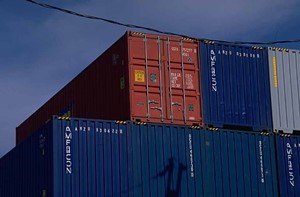Doing business in Sudan: general information
General Information about Sudanese business climate
There are many commercial and specialized banks, which have branches in 26 states. Also there are foreign exchange bureaus (The exchange rates are determined according to the demand and supply factors (market forces).
Official Working Hours:
Government Offices 7:30h – 16:30h.
Banks 9:00h – 14:30h.
Shops 8:00h – 23.00h.
Foreign Currencies
Regulations on import and export of foreign currencies are subject to frequent changes. Please check latest info:
For more information:
Export & Import:
Sudan exports are mainly crude oil and its derivatives, agricultural products, livestock and gold. Main destination of Sudan exports changed during the last four years from European countries to Asian countries.
Sudan main imports include machinery & equipment, food stuffs, manufactured goods, chemicals, transport equipment, textiles, medicine and crude materials. Arab and Asian countries were main origin of Sudan imports
Of late, due to perceived uncertainty, Sudan’s economy is showing signs of increasing stress, with investors take a wait and see attitude, capital outflow and related to this weakening of Sudanese pound, resulting among others in imports becoming more costly and increasing concern about rise in prices of key commodities.
Export Regulations
Exportation in Sudan needs registration of the exporter in importers/exporters registry.
Sudan applies the harmonized system for classification of exports, as in the case of imports. Export rates are ad-valorem, the export duty is 10% on cotton and gum Arabic, while on other products it is 5%. All these rates are on FAS value. There is also a 1%-2% quay duty for Sudan Seaport corporation and 1% for the Civil Aviation.
There are no quantitative or quota export restrictions. No license is required for export, except when there is no remittance, in which case an export license is issued by the Ministry of Foreign Trade and the Central Bank, and the salves contract needs to be stamped by the Ministry of Foreign Trade. Sudan has no indicative export minimum prices, which are based on the internal cost and world market prices. There are no voluntary export restrictions and no orderly market arrangements.
Import Regulations
Sudan does not apply any quantitative import restrictions. All goods can be imported to Sudan except those which are prohibited by social values or security considerations. These goods are spirits and wines, narcotics, gambling equipment, arms and ammunition.
Some guidelines:
- Generally, imports do not need an import license;
- Sudan does not apply any other border measures;
- Sudan uses the Brussels definition of value (BDV);
- Importers must present an Import Declaration, Commercial Certificate of Origin, Quarantine License (where necessary), Sudanese Standards and Metrology Organization (SSMO) requirements or other documents for specific type of goods and complete Bank of Sudan formalities;
- Importers must pay the required duties, taxes and fees and receive an official release order for the goods.
- Duties, taxes and fees are payable before releasing the goods except for direct delivery goods.
- Sudan has no mandatory Pre-shipment Inspection. Importers are advised to have Pre-shipment Inspection Certificate issued by International Cargo Inspectors registered by SSMO. Double check inspection might be conducted by the SSMO. All consignments, with no Quality Inspection Certificate will be subjected to SSMO inspection at entry points.
Rules of Origin
The Certificate of Origin for imports is mainly required when there are tariff preferences. The Certificate of Origin for export commodities is issued by Sudan Chamber of Commerce and checked by the Customs Authorities, and it is governed generally by the preference agreement such as the Rules of Origin applied or agreed upon in the Common Market for Eastern and Southern Africa States (COMESA), the Global System of Trade Preference (GSTP) and the Agreement of Trade Facilitation & Development among the Arab States.
Sudan has no separate Rules of Origin. The Certificate of Origin must be issued by the competent authority in the country of origin.
Sudan has no Anti-Dumping Law as yet.
Sudan has no Safeguard Law, however, Sudan is planning to formulate laws on safeguards and competition as well as anti-dumping.
Sudan has no tariff quotas. Tariff exemptions are available for investment projects governed by the Investment Law and for items within Article 54 of the Customs Law.
Importation & Exportation in Sudan needs registration of the importer or exporter in the Import/Export Registry at the Ministry of Foreign Trade according to the following:
Registration in the Chamber of Commerce as an importer or exporter.
An application form should be submitted to the Ministry of Foreign Trade for approval showing the following information:
- the amount of the capital used in the export/imports transactions;
- valid Trade license from the local Council where the importer or exporter will practice his business and the Certificate of Incorporation is the importer or exporter is a company;
- name and address of the applicant;
- certificate from a Chartered Accountant showing the amount of capital used in import and export activities in the last budget;
- payment of fees required for import/export registration (nominal ranging between SDG 5,000 and SDG 50,000), the registration is renewed annually.
VAT on imports
All import to Sudan is subject to VAT with 15%, except the following products:
– Agricultural inputs (seeds, fertilisers, and pesticides);
– Input papers for printing newspapers or magazines and printing equipment;
– Capital goods
Export Duties
All produce of Sudanese origin when exported to any country are not subject to any export duty with the exception of raw hides of skins which are subject to 15% export duty. All exports are exempted from the VAT.
For more information, contact:
- info@ssmo.gov.sd (Sudanese Standards & Metrology Organisation)
- www.industry.gov.sd (Ministry of Industry)
Other useful links of Commercial & Industrial Associations
- Sudanese Businessmen & Employers Federation: www.sudabiz.org or info@sudabiz.com
- Sudanese Chambers of Industries Association: www.sudanindustry.org
- Union of Chamber of Commerce: www.sudanchamber.org.sd or info@sudanchamber.org.sd


